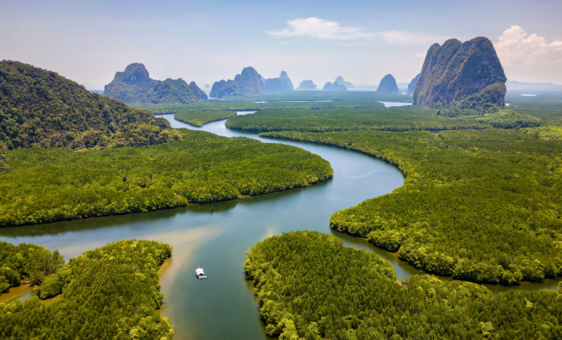The Evolution of the Workplace
The digital revolution, which kicked off with the use of automated production and information technology, has utterly transformed the way that people in industrialised nations live and work. In the financial services and entrepreneurial sectors, in particular, the availability of communications technology allowed greater freedom of movement. There is no shortage of breathless commentary from the ‘90s marveling at how professionals are no longer “tied to their desks” and could work from anywhere, but for many, the early phases of the digital revolution did not provide the benefits as advertised. Yes, we can work from anywhere, but we can also work all the time. And in many industries, improved communication technology did not result in less time in the office. It meant that we were in the office for a regular shift, then taking our phones and computers home at night to continue the work there. Only in rare cases did the digital revolution actually result in less time spent under fluorescent lighting. Few businesses were agile enough to unchain themselves from their office spaces and go fully remote.
Then came the lockdown. The Covid-19 pandemic resulted in unprecedented restrictions on freedom of movement and public gathering. It was no longer a question of choice: many businesses were forced to move closer to full remote working. For the most part, it worked. Suddenly, we are all digital nomads.
The New Nomad
Long a feature in cafes everywhere, the digital nomad has been stereotyped as the ‘creative type’. Writers, freelancers, photographers, bloggers, vloggers, website developers: all living a life unattached to any workplace accoutrements other than WiFi. When you picture a digital nomad, you probably do not picture a suit.
What the “work from home” response to the pandemic proved to many is that there are people in more conventional business roles who could do the job just as effectively, if not more so, without the commute and packed lunch. And if it is the case that we can do our jobs from home, then who is to say where “home” has to be?
Appleby’s enviable global footprint reads like a bucket list of exotic travel destinations. Expatriate workers (meaning those who make a longer-term commitment to leaving their home countries and working overseas for an employer located in another jurisdiction) have long been a feature in most of our locations. True nomads (who continue to work for themselves or their existing employers and who typically make a shorter-term commitment to any one location) are relatively rare, for two reasons. Firstly, laws and regulations designed to protect local businesses and provide employment opportunities for citizens may result in a digital nomad skirting, if not actually breaching, local law. Secondly, there is the issue of the cost of living. Nomads looking to live on the cheap while enjoying the charms of an under-developed, rustic tropical paradise will find a better fit elsewhere.
These two factors have combined to make the Appleby jurisdictions less appealing to the traditional digital nomad, but Covid-19 throws another factor into the mix. Our small island jurisdictions have done a remarkable job of maintaining public safety during the pandemic. Local governments, well aware of the negative impact of the slow-down in tourism, have begun to recognise that effective control of Covid-19 is a big selling factor for long-term visitors. Executives used to working internationally, entrepreneurs, fund and asset managers, high net worth families and the like are very interested in the safety and comfort they can find in our jurisdictions. Has the time finally come for the professional nomad? Is the expatriate life more appealing in the Covid age? Is residency-by-investment and ownership of foreign property in a relatively Covid-safe jurisdiction more attractive than ever?
In the following segments, we look at the current legal and regulatory structure relating to foreign employment, property investment and residence in each of Appleby’s key jurisdictions. We also look ahead to the future: a future that has come to us perhaps a bit quicker than we anticipated, but one that brings with it some unexpected opportunities.
Bermuda
With its ideal mid-Atlantic location and existing business community, amenities and infrastructure, combined with its high standard of living and relative shelter from the pandemic, Bermuda is an attractive destination for globally mobile investors, entrepreneurs, digital nomads and post-secondary students. Government’s Work from Bermuda initiative is open to applicants from all industries, but many insurance and technology professionals will already be familiar with the Island by virtue of its established reputation in those sectors and may be particularly interested in the opportunity to work remotely from Bermuda.
Successful applicants must, among other things, possess valid health insurance coverage and be able to demonstrate employment with a legitimate company, or their own company, registered and operating outside of Bermuda, or have substantial means or a continuous source of annual income. There is a fee of $263 per applicant. The Government of Bermuda has indicated that the turnaround time will be five working days and that renewals of the residential certificate (beyond the initial 12-month period) will be permitted on a case-by-case basis.
It is possible for applicants to bring their families, provided each family member submits his or her own application, and they can enroll their children in local private schools. Applicants will be able to rent long-term vacation homes and other properties. To purchase a property, applicants will need to follow the land licence process and restrictions that are already in place for international purchasers (about which more is said below).
Although aimed at remote workers, it is likely that one of the long-term objectives of the initiative is to encourage the growth of business and jobs in Bermuda. Despite the new initiative, successful applicants who are interested in making Bermuda a permanent base for their business will still need to adhere to various legal, regulatory and immigration requirements.
Non-Bermudians are subject to some restrictions on property ownership in Bermuda. Having found and contracted to purchase a property within the available categories (Bermuda realtors readily identify such), restricted persons must apply for and obtain a licence from Government. Typically, the licence is issued some months after application and on payment of the appropriate fee (ranging, dependent on property type, from nil to 8% of the value of the property in question) plus a sliding scale transfer tax (stamp duty) of approximately 5 to 7%, dependent on the value (typically shared between buyer and seller). Provided the applicant can demonstrate independent wealth, health insurance cover and good character there should be no issue with grant of a licence. After grant of the licence, a purchase completes and keys are handed over.
Ability to purchase property is not linked to employment, or residence in Bermuda; these are separate immigration issues.
Bermuda is a self-governing British Overseas Territory and does not impose wealth or property taxes other than a bi-annual land ownership tax. The final court of appeal in Bermuda is the Privy Council located in London. The Bermuda dollar is at par with the US dollar and property purchases are often made with US dollars.
Appleby can advise on all aspects of buying and owning property in Bermuda.
British Virgin Islands
The BVI took a timely and firm approach in tackling the Covid-19 pandemic in the jurisdiction by implementing protective measures, such as early border closure, curfews and the enforcement of mandatory, Government-monitored quarantine for all confirmed cases and returning citizens and permanent residents. These measures blessed BVI inhabitants with a seemingly Covid-free summer.
After enduring a hard 24/7 Government-imposed curfew lasting several weeks earlier this year, along with the full shut down of most physical businesses, the BVI was able to lift the curfew and gradually re-open within its borders for some weeks.
Recently, due to a resurgence of Covid-19 infections in the BVI, its Government has re-introduced a curfew effective 29 August 2020 to 1 September 2020 between the hours of 5:01 p.m. and 4:59 a.m. daily and with effect from 2 September 2020 to 16 September 2020 from between the hours of 1.01 p.m. to 4:59 a.m. daily, and has restricted the opening of physical businesses.
Phase 1 of the Protocols for Controlled Re-entry of Persons (Virgin Islanders, Belongers, Permanent Residents and a few exempt individuals) began in early June, with the BVI borders remaining closed to everyone else. Reopening of borders for work permit holders, residents and a few limited categories (with certain conditions and restrictions for each particular category) is yet to take place although scheduled to begin in early September 2020 in Phase 2 of the Restricted Border Re-opening Plan. Phase 2 will also allow special categories of persons to enter the BVI (for no longer than five days), including, among others, aviation and maritime crew, healthcare practitioners and specialised workers.
Despite progress being made on the reopening of BVI’s borders, the Government is yet to announce a plan for the borders to reopen to tourism. In these circumstances, combined with certain travel challenges facing those residents in the BVI, it is currently unlikely that the BVI will implement a program for granting digital nomad visas to remote-working individuals to encourage the temporary relocation into the BVI of these workers or business owners.
Whilst at this time the BVI may not be an appealing destination for temporary or short-term visitors, it remains an attractive jurisdiction for companies and investors. In fact, although currently physical presence may be difficult to achieve, the BVI remains a fully operational financial services hub, having put in place extensive measures to guarantee business continuity throughout the Covid-19 pandemic.
The carrying out of a company’s ordinary course of business and all activities such as applications for incorporation, trade licences and the purchase of land have not been significantly affected, thanks to the BVI’s promptly set up net of contingency measures. Filings and court hearings as well as BVI court and Corporate Registry services have, in fact, been taking place electronically, with business service providers and industry professionals working remotely without disruption to business hours. These circumstances, coupled with the BVI’s world leading technology platforms, namely the BVI Registry of Corporate Affairs’ Virtual Integrated Registry Regulatory General Information Network (“VIRRGIN”) and the Beneficial Ownership Secure Search (“BOSS”) System, make the BVI a jurisdiction with the infrastructure necessary to facilitate the digital nomads’ activities.
Cayman Islands
Cayman has not been unaffected by Covid-19. While the first case – a cruise ship passenger – was not recorded until mid-March, the Cayman Islands Government had been preparing for the inevitability of a pandemic for months before the infection reached the jurisdiction.
Containment measures were swiftly implemented; firstly, travel was halted through the closing of international borders and a few days later, through a combination of hard and soft curfews, domestic movement was restricted to all but the most essential of activities. Government also adopted a robust program of testing and contact tracing.
In a relatively short period of time, local transmission was eliminated and domestic restrictions were eased. The jurisdiction suffered just one fatality – the first recorded case – and despite one of the highest per capita rates of testing in the world recorded only 205 positive cases. As of the date of publication, Cayman is Covid-free.
Now that domestic restrictions have all but disappeared, the Government’s attention is turning to the challenging task of safely re-opening the jurisdiction to international visitors. The phased approach, scheduled to commence 1 October 2020, will begin with the re-opening of Grand Cayman’s international airport to longer-term visitors and those looking to relocate to the Cayman Islands on a temporary or permanent basis. On-going requirements for temporary self-isolation or quarantine and the implementation of geofencing technology for arrivals will mean that short-term visits remain impractical for some time.
Digital Nomads and Operating Businesses in the Cayman Islands
At the time of writing, the Government is exploring the sort of digital nomad visa that has been introduced by countries such as Barbados and Bermuda. Until such an initiative is implemented, visitors to the Cayman Islands may be permitted to reside (but not work) for up to six months which, upon application, could be extended for further periods of up to six months each.
To work in or from the Cayman Islands, every individual who is not a Caymanian or who does not fall within a limited number of exemptions is required to hold a work permit from his or her employer prior to arrival. Employers/self-employed persons are also required to hold a trade and business licence (further local licences may be required depending on the nature of the business vehicle and its activities). However, those in the commodities and derivatives, science and technology, media, internet or maritime and aviation sectors may be able to take advantage of Cayman Enterprise City, a suite of special economic zones designed to offer a streamlined and cost-effective way to relocate international businesses to the Cayman Islands.
Since this article was published, the Cayman Islands Government introduced a “Global Citizen” programme that will allow foreigners to apply for permission to reside in the Cayman Islands and work remotely for a limited period. For the full text of our release on the new programme, click here.
Residency by Investment[1]
High net worth individuals and their families can acquire the right to reside (and work, in some cases) in the Cayman Islands on a longer term basis where significant investment is made into developed real estate or qualifying local enterprise.
Beyond stamp duty payable on the acquisition of real estate interests, there are no ongoing or recurring taxes triggered solely as a result of property ownership, or any capital gains taxes on disposition. Given that there are no restrictions on foreigners acquiring a residential property in the Cayman Islands and that the local real estate market has remained relatively strong throughout the Covid-19 crisis, the following options for residency by investment in real estate are popular amongst those looking to establish a base in the jurisdiction (the Cayman currency amounts below convert into US dollars at the rate of KYD1.00 equals USD1.20):
- a Residency Certificate for Persons of Independent Means is a 25-year right to reside (but not work) in the jurisdiction, available to those able to demonstrate certain financial means and an investment of at least KYD1,000,000 in real estate in Grand Cayman (at least KYD500,000 of which must be in developed real estate, such as a condominium or a house)[2]; and
- a Certificate of Permanent Residency for a Person of Independent Means is a permanent right to reside (which may be upgraded to a right to also work) in the jurisdiction and opens a path to British Overseas Territory Citizenship and ultimately Caymanian status. To qualify, applicants must not only demonstrate certain financial means but also invest at least KYD2,000,000 into developed real estate in the jurisdiction. This option is currently subject to an annual quota of 250 successful applicants.
For those not interested in the minimum threshold for real estate investment, there are two other routes available through investment in qualifying local enterprise:
- a Certificate of Direct Investment is a 25-year right to reside and work in the Cayman Islands available to those making an investment of at least KYD1,000,000 in an undertaking that employs a workforce (of which at least 30% are Caymanian persons) and in respect of which the applicant exercises substantial management control and possesses relevant experience; and
- a Residency Certificate (Substantial Business Presence) is also a 25-year right to reside and work in the Cayman Islands for those holding a senior management position and an equity interest of at least 10% in an approved category of business.
The ability of the Cayman Islands to insulate itself from the worst aspects of the pandemic and yet remain a secure and business-friendly location has only enhanced its reputation as an attractive place to invest in order to base oneself in a sophisticated offshore jurisdiction on an intermittent or permanent basis.
[1] This section is intended to present a high level summary of the options available. Detailed eligibility criteria and fees apply, which vary depending on the route selected. For specific information on eligibility and costs of a particular option, please contact Appleby to arrange a consultation.
[2] KYD500,000 and KYD250,000 respectively if the applicant intends to reside on the islands of Cayman Brac or Little Cayman.
Guernsey
Over recent years, Guernsey has sought to position itself in the global marketplace as an attractive location for digital nomads by offering an attractive lifestyle and by simplifying navigation through its immigration system. What makes Guernsey particularly attractive now is the fact that it is one of the few places in the world that, at the time, of writing, has not had any diagnosed Covid-19 cases since the start of May 2020 and, aside from travel restrictions, has completely emerged from local lockdown.
Although Guernsey is a separate jurisdiction, it still falls within the UK immigration system and so, in the post-Brexit world, there remains a good deal of uncertainty as to what the future holds for EU citizens. However, as things stand anyone with an EU passport or married to an EU passport holder can gain access to Guernsey without any requirement for a visa. For non-EU passport holders, assuming you are not joining an existing business that will sponsor a work permit via a Tier 2 visa, there are generally two ways to achieve residency by investment:
- Investor visa route: the applicant must (a) have £1m available and under his or her control; (b) make an investment of at least £750,000 for the benefit of the Bailiwick of Guernsey either by way of a deposit in a Guernsey bank, purchase an “open market” property, or an alternative approved investment; or
- Entrepreneur visa route: the applicant must invest £200,000 in and manage a new or existing Guernsey company, be involved full-time and have a controlling or equal interest in the business, based on an approved business plan that will create jobs.
In addition to the UK immigration system, Guernsey has a second tier immigration system known as “Population Management”, principally designed to protect Guernsey natives. It is important to note that UK and EU passport holders are not exempt from this system, so unless you are an Established Resident (8 years) or a Permanent Resident (born in Guernsey or lived here for 14 years), generally you will require an Employment Permit under this system to work in Guernsey. In addition, the Population Management system is used to control the housing market, which is divided into “local” and “open” market properties. The difference between the two is that generally only those who are classified as being Established or Permanent Residents or have been issued an appropriate Employment Permit can live in local market property, whereas generally anyone can live in an open market property. As a consequence, open market properties are more expensive, with many tailored towards high net worth individuals. Those taking the Investor visa route will almost certainly need to live in an open market property. Those taking the Entrepreneur visa route or EU passport holders looking to work in Guernsey may be able to apply for an employment permit, which would entitle them to access local market properties also.
In order to assist people looking to make the move, Guernsey has established its Locate Guernsey website.
Isle of Man
As a result of decisive and swift action taken concerning its borders, the Isle of Man is in the privileged position of being one of the few places in the world that, at the time of publication, has been Covid-19 free for over 100 days. It is a flexible jurisdiction which is very well placed to welcome digital nomads seeking a lifestyle change. A recent survey also listed it as the safest place to live in the British Isles.
Anyone can choose to buy a property anywhere in the Isle of Man (there are no zoned areas) as an investment or to live in. No restrictions are imposed on new residents or foreign investors for purchasing property in the Isle of Man, whether residential or commercial, and no stamp duty is payable. The Isle of Man also does not levy inheritance or capital gains taxes.
For UK and EEA nationals wishing to relocate to the Isle of Man, a work permit must be obtained in order to work on the Island unless an exemption applies for that particular role. During the months of the Covid-19 lockdown, the work permit system was suspended in its entirety, so that individuals employed in certain roles could, if necessary, change roles or take up alternative employment where required. This suspension has now been lifted along with all Covid-19 related restrictions. However, over the last few years a number of key changes have been made to the work permit system, which has been updated and turned into one of the most flexible and user-friendly work permit systems in the offshore world.
A critical advantage of the Island’s current work permit system is that it is not linked to an individual’s ability to occupy a property and applicants have the freedom to reside wherever they like on the Island. In addition, unlike many other offshore jurisdictions, the Isle of Man allows an individual engaged under a work permit who has undertaken five years’ work in the Isle of Man to become an Isle of Man worker automatically with no need for a work permit and no longer subject to conditions to employment on the Island.
From a digital nomad’s perspective, due to demand from industry, the Government introduced a key exemption from the work permit system which has been introduced for certain workers employed in digital, technology and e-business roles. Another major advantage is that the current system also allows for automatic spousal permits to be granted to the spouse of either a permit holder or someone who is exempt from the requirement to have a work permit. Applications can be made online and the process is streamlined with a quick turnaround time.
For non-EEA nationals, changes have also been made to the Isle of Man Immigration Rules, primarily in preparation for Brexit to ensure that the Island is well positioned to facilitate relocation to the Isle of Man. The old point-based system was replaced last year with the Worker Migrant visa which allows individuals from outside the EEA who have been offered a skilled job by an Isle of Man employer to live and work in the Isle of Man. This visa allows family members to apply for a visa and join the worker in the Isle of Man and allows travel abroad and return to the UK. An alternative route is the Isle of Man Worker Intra-Company Transfer (ICT) Migrant visa which allows multinational employers to transfer their existing employees from outside the EEA to their Isle of Man branch for training purposes or to fill a specific vacancy for up to a maximum of five years. Dependents may apply using the same visa criteria and applicants are not required to meet the English language requirements.
The Isle of Man has also been keen to support and recognise business creativity and innovation which may be of particular interest to digital nomads. A sub-category (Innovator) for business start-ups is aimed at individuals with business experience seeking to establish, join or take over one or more businesses in the Isle of Man for the first time with an innovative, viable and scalable business idea. With some exceptions, migrants will require a minimum of £50,000 to invest in the business. This category may lead to Indefinite Leave to Remain.
All of the Business Migrant routes involve a two-stage application process. A migrant wishing to enter the Island must first obtain endorsement from the Department for Enterprise. An application for endorsement will require the migrant to provide information, including the submission of a comprehensive business plan. The Department then determines if the proposed business venture will benefit the Isle of Man, assesses the source of funds, and monitors the progress of the business venture. The Government is proactive in liaising closely with the Isle of Man business community and, in particular, the Isle of Man Chamber of Commerce to ensure that new businesses and migrants have the support they need for their businesses to flourish.
The latest significant changes to the Immigration Rules came into effect in April 2020. These focus on high net worth individuals who are looking to make a substantial financial investment in the Isle of Man. The new Tier 1 (Investor) visa allows individuals who have at least £2,000,000 in investment funds to stay in the Isle of Man for up to three years and four months with options to extend or settle. This visa also allows an applicant’s family members to apply for a visa and join him or her in the Isle of Man. Applicants may also work or study, but there are some restrictions on the types of qualifying investment that can be made.
Finally, a number of other incentives are available to those looking to relocate to the Isle of Man. The National Insurance Holiday scheme came into effect in April 2019 and provides a refund on National Insurance contributions paid in the first 12 months of employment. The scheme is open to anyone who has not been tax resident in the Island for the immediately preceding five years and who moves to the Isle of Man to live and work in any role with a gross salary of £21,000 or more. Eligible employees pay National Insurance contributions during their first 12 months of employment and can then apply for a lump sum refund from the Income Tax division, capped at £4,000 per person. To qualify, the employee must remain employed for a continuous period of at least 12 months.
Also of note is an Employee Relocation Incentive which provides a 20% grant of up to £10,000 towards the cost of a relocating employee’s first year net salary (minimum salary must be £25,000) paid one year after successful recruitment. The incentive can be used for existing or new roles within the organisation and includes back-filled positions. Employers are able to use this incentive in a range of ways; some businesses have used it to find suitable candidates, others to engage with recruitment agencies, whilst many use it to support candidates with relocation costs. The overall objective of the incentive is to help local employers find additional, skilled workers and ensure they find continued growth and success in the Isle of Man.
Jersey
Jersey’s response to the Covid-19 crisis was swift and effective. The Government of Jersey pursued an aggressive ‘test and trace’ policy which resulted in Jersey having one of the highest levels of testing in Europe. Jersey’s exceptionally low positivity rate of 0.1% is even more impressive when considering the wide testing model employed.
A dedicated Contact Tracing and Monitoring and Enforcement Team has been successful in ensuring that impacted residents isolate comfortably and safely, thus far preventing any “second wave” of community spread. With these measures proving effective, Jersey has been able to re-open its borders.
Overall, Jersey has been extremely successful in controlling the spread of the virus, and while social distancing and hygiene measures remain the rule, day-to-day life is mostly back to normal.
Working in Jersey
There are strict controls in Jersey with respect to the employment of non-residents. In order to engage an employee in Jersey, any employer must obtain from the employee photographic ID and a valid Registration Card. That card will specify which one of the following four residential categories the individual falls into:
- Entitled (lived in Jersey for ten years)
- Licensed (an “Essential Employee” with less than ten years residence)
- Entitled for Work (lived in Jersey for five years, or married to an Entitled, Licensed or Entitled for Work person)
- Registered (someone who does not qualify under the other categories).
Anyone operating a business must also hold a Business Licence which is issued by the Population Office. That licence will specify:
- the permitted licensed activity;
- a cap on the number of Licensed employees the operator is allowed to employ; and
- a cap on the number of Registered employees the operator is allowed to employ.
There are some detailed rules around how these numbers are calculated as well as some exceptions in relation to short term arrangements and existing employees, but before engaging anyone to undertake any work in Jersey, specific advice should always be sought as to how the rules apply to the particular circumstances.
All non-EEA persons require a work permit to be employed in Jersey.
For the true digital nomad who does not intend to work for a Jersey employer in Jersey, the rules are less developed. Tourists are welcome in Jersey and it is understood that some visitors will wish to use their time in Jersey to continue working for their existing business or employer abroad. According to the Jersey Government’s own website, “If you’re a Commonwealth citizen coming to Jersey for a working holiday, you don’t need a work permit, but you will have to get entry clearance before arriving in Jersey.” While a full digital nomad immigration regime has not been developed in Jersey, currently there are no express restrictions against short-term tourists undertaking work for an existing employer remotely from the Island.
Property Ownership in Jersey
In the main, all purchasers looking to relocate to Jersey must have ‘Entitled’ status in order to be able to buy property on the Island. As mentioned above, long-term employment in Jersey may result in Entitled status. For some, this status may be obtained on social and/or economic grounds. For applications on economic grounds, the following factors are considered:
- likely contribution to tax revenues;
- business/social background of the applicant;
- number of dependents and the extent to which these persons may in time acquire housing rights if consent is granted;
- other non-economic benefits which the Island may receive if consent is granted;
- total net-worth; and
- possibility of the applicant bringing a business to the Island which will generate tax revenues and provide employment.
In terms of contribution to tax revenues, individuals who apply for Entitled status on economic grounds must demonstrate the ability to generate an annual minimum tax contribution of £145,000 and an annual sustainable, worldwide income comfortably in excess of £725,000. This means that property ownership in Jersey is really only an option for long-term residents or high net worth investors. However, the advantages are clear: Jersey is not part of the EU and is a self-governing Crown Dependency of the United Kingdom and Jersey does not impose wealth or property taxes other than Parish Rates. These are charged annually and go towards Parish expenses, maintenance of by-roads and garbage collection.
Jersey’s system of conveyancing real estate is unique and differs from the process in the UK and many other jurisdictions. For example, the buyer and seller are required to attend the Royal Court to consent to the sale or purchase of property. Although the process can at times seem complex, Appleby can walk clients through each step of the process, making it as clear, seamless and stress- free as possible.
Mauritius
Covid-19 arrived in Mauritius later than in much of the world. The first positive cases were only uncovered in March 2020, meaning that the Government had time to prepare an aggressive ‘contact tracing’ approach to containment. Community spread has been contained since 26 April 2020, with only repatriated passengers presenting new cases. Mandatory isolation and quarantine measures have resulted in the island remaining exceptionally safe. With social distancing, the wearing of masks and personal hygiene measures being widely adopted, at the time of publication Mauritius operates without restrictions.
Working in Mauritius
Over the past decade, the Mauritian Government adopted a number of measures to attract not only high net worth clients, but also highly skilled non-citizens in designated activities through the introduction of various programs which entitle a non-citizen to acquire residency and ultimately Mauritian citizenship. Non-citizens are permitted to purchase property within these different schemes, as long as certain requirements are met. This article focuses on the Smart City Regime, Residence Permits for retirees and their families, and Occupation Permits for investors, professionals and the self-employed. Each scheme has features designed to attract highly skilled and high net worth families, and the prospective digital nomad will wish to select the right program for his or her needs. Appleby is ready to assist any clients considering a move to Mauritius.
The Smart City Scheme
The Smart City Scheme was introduced in 2015 in order to attract investors by providing both fiscal and non-fiscal incentives for the development of what is known as a ‘smart city’. The Smart City Scheme revolves around the concept of ‘live, work and play.’ Land allocated to the project is to be used to develop:
- business facilities with a mandatory innovation cluster;
- residential properties, on the condition that the land area planned for these properties does not exceed 50% of the total allocated land area; and
- high quality public spaces which help promote social interaction, such as gardens, open plazas, cycle routes and pedestrian precincts.
The Smart City Scheme also provides for affordable housing units for middle-income earners. High performance energy efficiency measures are required. Information and communication technology is planned to sense, analyse and integrate the key information to provide intelligent urban management and services.
On 28 August 2020, the Mauritian Cabinet of Ministers met and confirmed that the Economic Development Board (Smart City Scheme) (Amendment) Regulations 2020 would soon be amended in order that regulations are in place under the Smart City Scheme. The amendments are intended to enable a non-citizen who holds an Occupation Permit or Residence Permit (both defined below) to purchase property for residential purposes. However, two conditions prevail: first, the surface area of the property to be purchased must be less than 2,100 m2. Secondly, the property in question must be situated within a Smart City area.
Residence Permits
The term ‘Residence Permit’ refers to a residence permit issued by the Prime Minister’s Office to a non-citizen for a renewable period of three years to enter and stay in Mauritius. To be eligible for such a permit, a non-citizen must be:
- a retiree over the age of 50 who can make monthly transfers the aggregate of which shall be at least USD18,000 per year during the ten years’ validity of the Residence Permit (that applicant’s children and spouse are also eligible);
- a dependent of a holder of an Occupation Permit (see below) (the applicant’s children and spouse hold tourist visas at the time of application are also eligible);
- someone who has acquired a residential unit of a value of not less than USD500,000 under the Smart City Scheme, the Property Development Scheme or the Invest Hotel Scheme (the applicant’s children and spouse are also eligible).
On 28 August 2020, the Mauritian Cabinet of Ministers approved the grant of a Residence Permit to a non-citizen who already owns immovable property, provided he or she has made a minimum investment of USD375,000.
Occupation Permits for Investors
An “Occupation Permit” is available to “Investors” of different categories, set out in the table below. The criteria for these categories were amended on 2 September 2020 and the table sets out both the previous iteration and the current amended form where relevant[1]. An investor, as defined under the Immigration Act, is a shareholder and director of a company incorporated in Mauritius under the Companies Act 2001.
| Applicant | Investment Criteria Prior to 2 September 2020 | Current Criteria |
| Investor | Initial investment of USD 100,000 or its equivalent in freely convertible foreign currency | Initial investment of USD50,000 or its equivalent in freely convertible foreign currency in the bank account of the company under which the application will be made; ornet asset value of at least USD50,000 or its equivalent in freely convertible foreign currency, for existing businesses and businesses inherited and a cumulative turnover of at least MUR 12 million (USD301,200) during the three years preceding the application; or initial investment of USD50,000 or its equivalent in freely convertible foreign currency, of which a minimum transfer of at least USD25,000 shall be made to the bank account of the company under which the application will be made and the equivalent of the remaining value in high technology machines and equipment, subject to such criteria as the Chief Executive Officer of the Economic Development Board (EDB) may determine. |
| Investor for innovative start-ups | Initial investment of USD40,000 or its equivalent in freely convertible currency and a minimum operation expenditure of 20% on research and development; or registered with an incubator accredited with the Mauritius Research Council and a minimum operation expenditure of 20% on research and development | The investor may submit an innovative project to the EDB or register with an incubator accredited with the Mauritius Research and Innovation Council. |
| Investor (only company incorporated under the Companies Act on or after 8 June 2017) operating a food processing plant for food processing activities and for the manufacture of products from agricultural and medicinal plants and herbs either as intermediate goods or finished products | The goods shall be produced by a process involving a value addition of not less than 20% of the ex-factory cost of the finished product and at least 50% of the final products manufactured by the company are exported, after two years from the date on which the company starts its operation. The goods intended for export must satisfy the rules of origin of preferential markets. | |
| Investor (company only) for the setting up of a film studio in Mauritius | Investment of at least MUR one billion (USD25,100,000) or its equivalent in freely convertible foreign currency and the investor to provide facilities to film production companies. | |
| Any other investor | Project value exceeding MUR 20 million (USD502,000). | |
An Occupation Permit for an investor is renewable beyond the initial period so long as certain turnover targets, as well as any conditions established by the Chief Executive Officer of the EDB, are met. From 2 September 2020, an investor is only required to earn a minimum gross income of MUR 4 million (USD100,400) per annum in order to qualify for renewal. With respect to an investor for innovative start-ups, there is complete flexibility; the conditions for renewal are determined by the Chief Executive Officer of the EDB.
Occupation Permits for Professionals
Occupation Permits are also available for professionals in the sectors of information and communication technologies, business process outsourcing, pharmaceutical manufacturing and food processing. Professionals in these sectors must have a monthly basic salary of at least MUR30,000 (USD753). For a professional in any other sector a monthly basic salary of at least MUR60,000 (USD1,506) is required. For a young professional, the completion of at least an undergraduate degree in a tertiary education institution recognised by the Higher Education Commission in a prescribed field is required.
Occupation Permits for the Self-employed
Self-employed persons may also be eligible for an Occupation Permit. The self-employed person should have an initial investment of USD35,000 or its equivalent in freely convertible foreign currency at the time of issue of the Occupation Permit and be engaged in a services sector only. Prior to 2 September 2020, the self-employed were required to have a cumulative business income of at least MUR2,400,000 (USD60,850) during the three years preceding the application for the Occupation Permit and a business income of at least MUR600,000 (USD15,210) per annum. From 2 September 2020, the minimum business income of the self-employed person is MUR800,000 (USD20,300) per annum from the third year of registration.
Conclusion
Mauritius is a place of astonishing natural beauty, populated by a diverse and multi-cultural people and with a welcoming and progressive regulatory regime. With the policies described above, Mauritius is well-placed to offer any professional or entrepreneur an ideal location for work and play.
[1] In addition to changing some of the existing definitions, the amendments of 2 September 2020 removed three categories of investors: “Investors already operating but not registered with the EBD,” “Investors who have inherited a business in case of death or incapacity of the previous investor,” and “Investors in high technology machines and equipment.” These have been essentially folded into the broader definitions in the new regulations.
Locations
Bermuda , British Virgin Islands, Cayman Islands, Guernsey, Hong Kong, Isle of Man, Jersey, Mauritius, Seychelles
Services
Corporate, Private Client & Trusts, Property, Wealth Structuring















